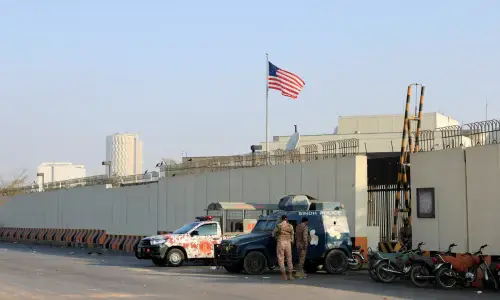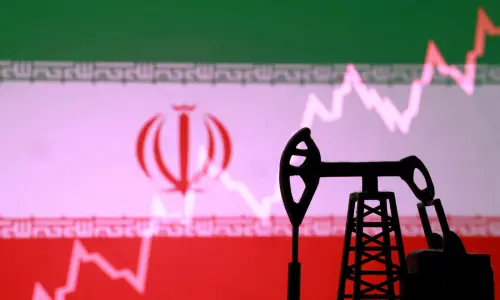Mild-mannered professional
 FOR a man whose career took him to some of the most happening places, Tahir Mirza hardly ever showed signs of restlessness. Lucknow, Karachi, Dhaka, Lahore, London, Dubai, Washington, wherever fate took him, he was known as a mild-mannered gentleman who did not lose his composure even in the most difficult of times. Nor his firmness, which was a trademark with T.M.
FOR a man whose career took him to some of the most happening places, Tahir Mirza hardly ever showed signs of restlessness. Lucknow, Karachi, Dhaka, Lahore, London, Dubai, Washington, wherever fate took him, he was known as a mild-mannered gentleman who did not lose his composure even in the most difficult of times. Nor his firmness, which was a trademark with T.M.
And wherever he went, the inspired lot that looked up to him knew that for him there was no going away from journalism. He was in it for the long haul, undeterred by frequent desertions from the ranks by those who found journalism either not as exciting or not as paying as some of the other professions. “Given a chance, I will repeat it all over again,” he once told colleagues in ‘Dawn’.
It wasn’t only the desk where he excelled. He took a stand for what he believed in, like good relations with India and the press’s relations with the government. Mirza Sahib’s odes to old Delhi made Lahore, the city he had so often declared his love for, envious. He would occasionally lift his guard to reveal the naughty youth inside. In one of his first pieces after retirement as editor of Dawn, he related a dog-and-man joke to convey just how strongly he felt about the way General Ziaul Haq had run the affairs of this country. The revelation was testament to the extreme restraint he had exercised during his years as editor. What he expressed now were his personal views and could not be confused as necessarily being the opinion of the paper.
During his days at ‘The Pakistan Times’, Mirza Sahib took part in trade union activities. He was a delegate at the Biennial Delegates Meeting (BDM) of the Pakistan Federal Union of Journalists (PFUJ) in Karachi soon after the Ayub Khan regime had promulgated the notorious Press and Publications Ordinance (PPO) in 1963. Mirza Sahib moved a resolution against the ordinance and on his initiative another resolution on the overall situation obtaining in the media was tabled and passed unanimously. The BDM demanded the repeal of the PPO and also portrayed a dismal picture of the press across the country which then included East Pakistan. That became a moot point at all the subsequent meetings of PFUJ.
Away from trade union and in the office, his associates in Dawn remember him as an extremely professional editor who wanted to know all, and in time. “I don’t want any surprises,” he would tell the newsroom and would remain in touch with the person in charge of the edition till the eleventh hour. “Feel free to call me anytime,” was his parting line as he went home every evening.
He was not shy of accompanying the reporters for an important interview and was least amused by the gory pictures painted in the name of descriptive reporting. Annoyed, he would pull up the ‘errant’ reporter on such occasions by calling him a ‘mister’. “The moment he addressed one of us as ‘mister’ we knew that there was trouble in store,” recalls an old colleague of his at Dawn Lahore. The ‘trouble’ in an extreme case would entail a reprimand.
“His tone was polite to the point of being sympathetic,” says Ali Ahmad Khan, who worked with the ‘witty’ Tahir Mirza in the BBC. “He made light of difficult situations.”
His son, Amir Mirza, got a fair share of Mirza Sahib’s reprimands when he briefly tried his hand at journalism in the early 1990s. “Why does he always try to be funny,” Mirza Sahib would ask Amir’s editors in a ‘rival’ publication in Lahore. “How can you allow him so much leeway? Please keep him in check.”
Just how responsible and caring he was in his family affairs was reflected in a decision he had made some 25 years earlier. In 1965 in St. Paul, Minneapolis, on a world Press Institute scholarship, he left for Lahore halfway as war with India loomed large. Decades later, in 1998 to be precise, a journalist from Lahore came across a Japanese coursemate of Mirza Sahib who reminisced about a certain suave gentlemen from Pakistan who was particularly popular among his female colleagues. John Hodowanic, who was by now the executive director of the World Press Institute in Minneapolis, remembered Mirza Sahib as someone who left behind a deep impression on all he came in contact with during the couple of months that he was there.
No wonder then that those who had the privilege of knowing him for longer feel so deprived by his absence.
A gentleman to the core
TAHIR Mirza Sahib was as private about his health as he was considerate of its emotional fallout on his family. To his last weeks he used to say his son, daughter and daughter-in-law were unnecessarily fussing over his illness, worrying his wife too. About Amir and Noma he reflected with stars in his eyes. The grandchildren and his wife were his best friends. Parveen Mirza’s opinion for him was the last word. If you went to call on him to inquire after his well-being, you’d find him embarrassed by the visit; but hospitality never eluded him. He would insist you be brought a hot or cold beverage. You’d finally settle for a homemade paan just to put him at ease.
Then the conversation would turn to good old days in Lahore. It was as if he wanted to talk about people and places that had gradually receded into past and then become distant, even inaccessible. Reminiscing about trips to Delhi, as and when an occasion entailed, talking about going to a mosque in Lucknow as a young boy which resulted in straining his relations at home until his father made him leave the maulvi’s company, or slurping on mangoes under a shaded tree in Saharanpur, which “still has a lot of ‘characters’” all belonged to an emotional landscape inhabited by the caring person Tahir Mirza was. You didn’t want to tire him, and waited for him to give a pause so you could get up and leave.
Sometimes he would call to ask you to go through his article and to tell him how you felt about it. So considerate was he of others’ feelings and also about being objective in his writing that he always wanted a second opinion. One thing he did not approve of was abrasive argument, no matter what the situation, and he applied the same rule to himself — in his conversations, in his writing. When faced with such a situation he would take the moral high road and walk away, but always with a smile so as not to give further bait to the other person.
“The only way to get respect is to show respect; and be always respected for your hard work. Once you do that there is no reason why anyone will not respect you,” he would say politely to an errant colleague, implying that respect has to be earned, not claimed as a matter of right. But such plain talk was far from him. Facetious argument wore him out as fast as intelligent disagreement perked him up. He hid a naughty smile behind a composed, gentlemanly disposition, which said it all in a most eloquent manner.
There were moods of candid reflection when he would think aloud on a waning generation that was equally good at Urdu and English. Quoting in the same conversation from Shakespeare and Ghalib or even Hafiz was not beyond him. The changing Urdu idiom, especially the post-Ziaul Haq lexicon that includes ‘Allah’ Hafiz bothered him. Slang generally put him off unless it was an IT euphemism, which he would permit himself to be curious about.
Impromptu mentioning of arhar ki daal with onion ka bhagar was reserved for such light moments, followed by a reference to age-old kebab recipes that transported him back to UP. “People had too much time back then, I suppose?” he would leave the matter open ended to let you add the last word. An opportunity he believed he owed you for being in the conversation.
Tahir Mirza belonged to the fine breed of men who were cast naturally as role models in human decency. It was a pleasure being around him, which now seems but a lingering, pleasant dream that exposed you to an unreal world of manners and intellect to which he belonged.
| © DAWN Group of Newspapers, 2007 |




























